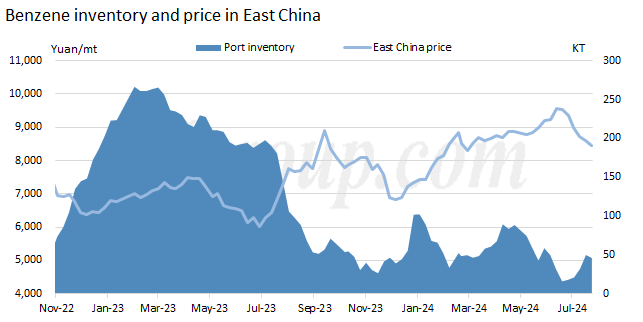Benzene price declines amid weak supply-demand structure
In the past month, the benzene market experienced a consistent decline in prices, driven by both supply-demand dynamics and external factors. Spot prices at Jiangsu Port began the month at around 8,800-8,900 yuan/mt, ending at approximately 8,355 yuan/mt, reflecting a steady downward trend. The FOB Korea market also followed suit, with prices dropping below the $1,000/mt mark.
The monthly average benzene price showed a significant downward trend, primarily due to weakening market fundamentals and external pressures. The benzene-naphtha spread (BZN) narrowed considerably, starting at around $298/mt and compressing further, leading to bearish market expectations.
| Operating rate (%) | 28-Jun | 26-Jul | |||||
| Oil-based benzene | 87.4 | 86.7 | |||||
| Oil-based benzene(Asia) | 73.8 | 75.1 | |||||
| Coal-based benzene | 63 | 56.5 | |||||
| Styrene | 66 | 64.7 | |||||
| Phenol | 75.9 | 71.6 | |||||
| Adipic acid | 61.5 | 64.5 | |||||
| CPL | 102 | 92.5 | |||||
| Aniline | 92.1 | 87.1 | |||||
| Cyclohexanone | 14 | 50 | |||||
| MDI | 76 | 61 | |||||
| Inventory, kt | 26-Jun | 26-Jul | |||||
| East China port | 18 | 46 | |||||
Supply levels fluctuated throughout the month due to various factors, including the return of domestic production capacities and unexpected arrivals at ports. High arrivals at Jiangsu's main ports, estimated at over 70,000 tons in early July, created an oversupply situation. This influx, along with strategic selling by holders looking to capitalize on price differentials, pushed prices downward.
The international benzene market, particularly in USD terms, also influenced price dynamics. The decline in USD-denominated benzene prices, combined with bearish discussions and generally weak market sentiment, added to the downward pressure on domestic prices. Market sentiment was further dampened by lower-than-expected adjustments in Sinopec's benzene listing prices.
On the demand side, downstream industries such as styrene, CPL, phenol-acetone, and aniline experienced varying production levels. Some units reduced operating rates due to operational issues, while others saw marginal increases or remained stable. Overall, the demand from these industries was insufficient to absorb the excess supply, leading to a persistent imbalance.

Inventory levels at major ports played a critical role throughout the month. Despite high arrivals, port inventories remained relatively low, providing some support to the market. However, the ample supply from both domestic production and imports overshadowed this support. Cautious market sentiment and limited buying interest at higher price levels prevented significant restocking activities.
The benzene market saw a consistent decline in prices over the past month, influenced by oversupply, weaker international markets, and subdued downstream demand. While low port inventories and occasional restocking by contract holders provided some support, these factors were not enough to counteract the bearish pressures. As a result, the market ended the month on a weak note, with prices continuing to face downward pressure. Looking ahead, the market is likely to remain sensitive to changes in supply dynamics, downstream demand, and external market conditions.
- Top keywords
- Cotton Price
- Cotton Futures Price
- Cotton Futures
- CZCE
- PTA Futures Price
- Chemical Fiber
- Polyester Prices
- Wool price
- PTA Futures
- Shengze Silk
- China
- Yarn Price
- price
- China Textile City
- Fibre Price
- Benzene Price
- Cotton
- Index
- Cotton Index
- PTA
- fabric price
- NYMEX
- Top 10
- textile industry
- Spot Cotton
- Cotton Yarn
- Polyester Price
- Futures
- PTA Price
- cotton yarn price

